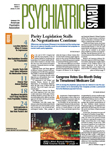By the end of 2007, Congress had made the most progress to date on passing legislation mandating that health plans cover mental health and substance abuse treatment to the same extent that they cover other medical and surgical treatment. Ultimately, however, the legislation fell short.
Following Senate and House approval of different versions of mental health parity legislation (S 558, HR 1424), negotiators were unable to overcome their differences.
Despite the remaining obstacles, parity supporters are still optimistic that a compromise will be reached this year.
“A compromise is very doable,” said Nicholas Meyers, director of APA's Department of Government Relations, about the bills, both of which APA has endorsed. “But it will require some give on both parts.”
The differences between the House and Senate negotiators have come down to three main areas: which types of mental illness should be covered, what out-of-network benefits will be offered, and what approach will allow the best preservation of stronger state laws.
Nonetheless, both bills require that insurance plans that include mental health benefits must cover those benefits at parity with in-network or out-of-network medical/surgical benefits. Thus, passage of either the Senate or House version, Meyers said, would constitute a major improvement over the current 1996 Mental Health Parity Act, which only guarantees equality in annual and lifetime payment limits.
One of the main differences over which negotiators remained deadlocked was that the House bill would require any plan that provides mental health parity coverage to recognize all illnesses in the Diagnostic and Statistical Manual of Mental Disorders (DSM). The Senate measure would leave it up to health plans to determine the psychiatric conditions they would cover.
“Unlike the House version, the Senate bill does not require health plans offering mental health benefits to cover the same mental health and substance-related disorders that are included in the health plans available to members of Congress,” said Rep. Patrick Kennedy (D-R.I.), in a written statement when the House passed its version.
Business and insurance-industry lob-byists have opposed a DSM-based diagnosis standard, arguing that it might require treatment of any condition listed in the manual. Supporters of the House bill counter that while it does compel treatment of DSM-IV conditions, it leaves it up to the plans to decide the extent of treatment they will cover.
Negotiators also were unable to find common ground on differences in out-of-network benefits. The House bill would require any plans that include an out-of-network benefit to also offer out-of-network parity mental health coverage. The Senate version would allow plans to offer a medical/surgical out-of-network benefit without offering a corresponding mental health benefit. If the plans did offer an out-of-network mental health benefit, they would have to do so at parity.
Critics of the Senate version said it might have unforeseen effects.
“Parity proposals that do not require any coverage for out-of-network [mental health] benefits may paradoxically have the unintended adverse consequence of decreasing access to mental health treatment,” wrote the authors of a parity study, including Darrel Regier, M.D., M.P.H., executive director of the American Psychiatric Institute for Research and Education, which was published in December 2007 on the Health Affairs Web site (Psychiatric News, January 4).
That study of insurance coverage in the Washington, D.C., metropolitan area found that as few as 38 percent of clinicians participated in any insurance network, so the services of the 62 percent who don't participate would not be covered for insurance-plan participants with policies that barred out-of-network mental health care. The study also high-lighted estimates that if parity for out-of-network benefits is required, 20 percent of professional services nationally would be provided out of network.
“Our study shows that even in an area relatively rich in mental health resources such as Washington, D.C., and its surroundings, plan networks are not equipped to meet the full need for mental health treatment,” Regier said in a written statement. “Maintaining the out-of-network option is essential to ensuring access to treatment.”
Although differences also remain in the ways the bills address state laws that provide stronger parity benefits, Senate negotiators have “moved fundamentally toward the House bill,” Meyers. Both bills would now allow those stronger state parity measures to stand.
The House bill has additional measures that require greater insurance plan transparency and reviews of the utilization of mental health benefits, which are not included in the Senate measure. These provisions have drawn less opposition from Senate negotiators and will be more easily resolved, Meyers said.
“I continue to believe that there is room for compromise here. I really hope they get this done, and certainly we will continue to support efforts to secure a compromise,” Meyers said.
